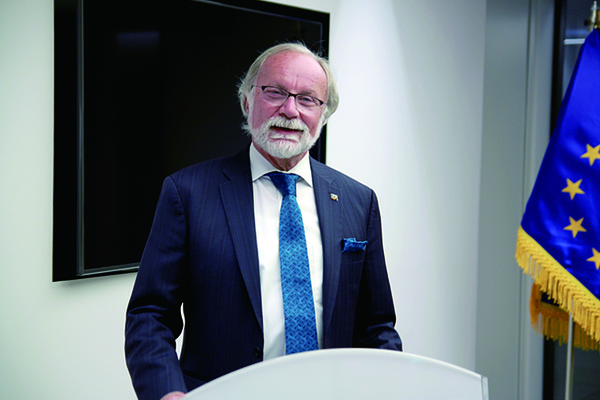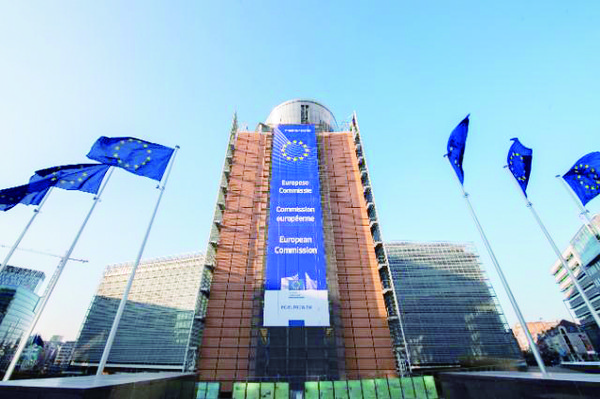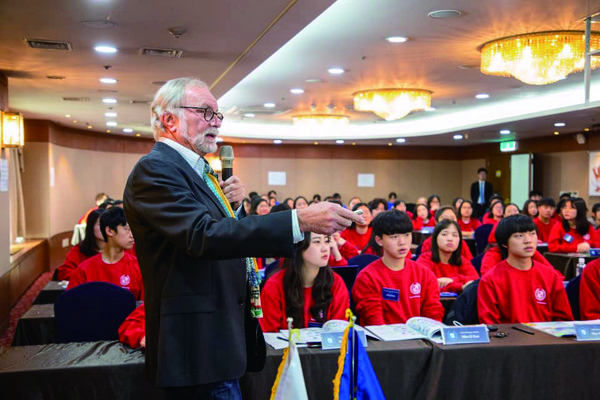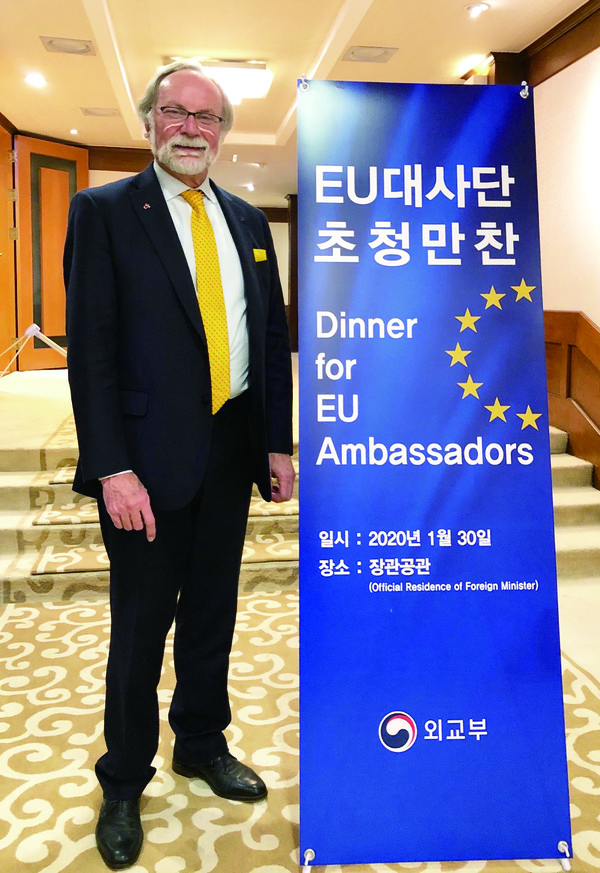Country report : Europe Day 2020

NDN Media Group (www.ndnnews.co.kr) & Seoulcity Magazine sat down with EU Amb. Michael Reiterer on the occasion of the Europe Day 2020 to hear about EU’s policy change in a circumstance where Britain left EU, EU countries’ investment environment for Korean investors, EU’s recent efforts to tackle Corona virus 19 pandemic and last but not least Korea-EU cooperation prospect in terms of not only larger conglomerates, but also SMEs of the two economic partners which constitute the backbone of their respective economies in the years to come. - Ed.
Please touch upon EU’s global efforts against Corona virus 19 including EU’s research & projects to prevent the spread of Corona 19 virus.
The European Union is committed to using all economic policy tools at its disposal to support Member States in protecting their citizens and mitigating the pandemic’s severely negative socio-economic consequences.
The fiscal measures taken at national level are estimated to represent around 3% of the EU’s GDP, or around €430 billion in absolute terms. Separately, liquidity support measures put in place by Member States to support firms and workers are estimated to be around 16% of the EU’s GDP, or around €2,240 billion in absolute terms.
In addition the European Commission adopted a new instrument called ‘SURE’ to provide more than 100 billion euros in loans-on favourable terms-to the Member States of the European Union, so that they can support employment and ensure that workers receive an income and businesses can retain their staff. This will help people keeping out of poverty and will prevent businesses from going bankrupt. It will also help our economies restart quickly.
Most importantly to underline here in Korea, EU solidarity does not stop at the borders of the European Union. Therefore, the European Union launched its “Team Europe” package to support partner countries in the fight against the coronavirus pandemic and its consequences. The objective of the “Team Europe” approach is to combine resources from the EU, its Member States, and financial institutions, in particular the European Investment Bank and the European Bank for Reconstruction and Development-we are talking about a financial envelope of €20 billion. It will focus also on the people most at risk, including children, women, the elderly, and people with disabilities, as well as migrants, refugees, internally displaced persons and their host communities.
As COVID-19 is unknown, research and innovation plays a key role to understand the structure, develop a vaccine and a cure as quickly as possible in the interest of all.
To this end €140 million have been mobilised to develop vaccines, new treatments, diagnostic tests and medical systems to prevent the spread of the coronavirus, and €48.5 million have been granted to 18 projects and 140 research teams from Horizon 2020 research and innovation funding programme. The Commission has offered CureVac, a highly innovative European vaccine developer, up to €80 million of support in the form of an EU guarantee of an European Investment Bank loan. The company aims to launch clinical testing of a vaccine by June 2020. Furthermore, the EU will soon convene an international online pledging event to mobilise the necessary funding to develop rapid diagnostics, treatment and vaccines for coronavirus and supporting the World Health Organization (WHO) to coordinate efforts in the most vulnerable countries. The EU, as global actor and major contributor to the international aid system, stands ready to coordinate a strong multilateral response to the pandemic, in partnership with the United Nations, International Financial Institutions, as well as the G7 and the G20.

What is the significance of Europe day to Korea which is eager to become a united Korea and its meaning in terms of its benchmarking for Korea?
Europe Day held on 9 May every year celebrates peace and unity in Europe. The date marks the anniversary of the historical 'Schuman declaration'. At a speech in Paris in 1950, Robert Schuman, the then French foreign minister, set out his idea for a new form of political cooperation in Europe, which would make war between Europe's nations unthinkable. His vision was to create a European institution that would pool and manage coal and steel production. A treaty creating such a body was signed just under a year later. Schuman's proposal is considered to be the beginning of what is now the European Union.
Europe Day is a symbol of Peace and reconciliation in Europe-finally rewarded with our Nobel Peace prize in 2012 - and as we are aware of President Moon's efforts to promote peace and reconciliation on the Korean Peninsula, we believe that Europe Day should have a particular resonance here too. As part of the virtual celebrations the EU is organising a chain of concerts and four renown Korean musicians participate.

How are the results of the summit talks or any ministerial meetings between Korea & EU through UN General Assembly plenary session, ASEM Meeting or G20, etc.?
This year we shall celebrate the 10th anniversary of the EU-RoK strategic partnership. We have organized a public competition for the logo of this important event which marks the EU-Korea relationship. This year a bilateral summit between President Moon Jae-in and the two presidents from the European institutions, Charles Michel and Ursula von der Leyen will be organized-either virtually or, conditions permitting, in reality in Seoul. We have to start looking at our renewed cooperation once the brunt of the pandemic is over. We need to continue to learn from what happened to address global health issues like pandemic, natural disasters, peace and security and other situations that can only be addressed effectively through our collective efforts.
How are the general investment environments for Korean investors to do business there or to invest into EU markets and last but not least what are the geographical edges while doing business among EU continents?
Korea’s Foreign Direct Investments (FDIs) outflow into Europe amounted to USD 13.56 billion (€12.24 billion) in 2019, up 14.9% from the previous year, registering impressive growth particularly in the financial and insurance sectors and real estate. This suggests that Europe is becoming a very competitive and attractive place for Korean investors. Under the EU’s “Investment Plan for Europe”, greater regulatory predictability has been provided, the bottlenecks to investment removed, and the single market further deepened. In particular, the more integrated capital markets and the common approaches among EU Member States towards investor-friendly regulatory environments would make Korean investors’ businesses in the EU easier and more efficient than ever. The EU has also put in place an investment screening mechanism allowing for a peer review of purchase intentions by foreign investors of EU strategic assets.

What are EU’s pro-environment & Digital Europe making including EU Commission’s human rights & democracy policy in the years to come?
The current global health crisis is showing the great potential that new technologies can have for the fulfilment and protection of human rights. First regarding public health, new technologies can provide alerts to the population of the health threat and the necessary measures to implement, at an unmatched reach and speed. In addition, digital tools can help states track the spread of the disease and process statistics more easily. In addition, the possibility to keep contact with loved ones while in confinement has a very positive impact on mental health of individuals. Technologies are also allowing millions of children and young around the world to have access to education, while around 80% of the world student population face the closure of educational facilities.
Despite these positive aspects, we are also aware of the risks of new technologies on human rights. For example, we are aware that some measures taken to respond to COVID-19 are fostering a misuse of new technologies, for instance: the abuse of mass surveillance and breaches of data privacy to track infected individuals; censorship of media and limitation on access to information and persecution of journalists reporting on COVID-19; or the spreading of hoaxes, fake news and hate speech online. While collecting health data might be necessary to fight the pandemic, personal information should remain confidential. In addition, use of surveillance technologies, such as facial recognition, or tracking via digital applications and geo-localisation has been witnessed. We are following closely developments around the world, and will convey concerns when measures are in breach of international human rights law and standards. We are also closely following the on-going discussions at the UN (OHCHR) on the matter. The EU will call for any measures taken around the world to be lawful, proportionate, necessary and time-bound.
Please mention about EU’s policy focus change to tackle not only EU issues but also any global agendas in a circumstance since Britain left EU
As you are aware, we are still in a transition period with the UK. This will end on 31 December 2020. We are still cooperating quite closely with the UK on a number of issues, including Covid-19 and climate issues since the UK was due to host COP26 in Glasgow-now postponed until 2021. We are currently discussing how we shall cooperate with the UK after the 31 December 2020. The EU side has also offered an extension to the 31 December deadline, which the UK has so far declined. The EU will continue implementing its domestic agenda and addressing global challenges.
Please tell us of your point of view on economic cooperation between Korean companies & EU enterprises not only within EU but also in the 3rd countries?
In fact, the main Korean investors in overseas markets remain large conglomerates and a handful of key manufacturing industries, accounting for 73.1% of Korea’s total FDIs outflow in 2019, whereas Korean SME’s investments beyond the border represented only 24.6% in the same year. I think that Korea’s innovative tech-based SMEs and start-ups can further grow into more promising international players, on the back of the government’s support for SMEs. The EU and the Republic of Korea are engaged in a very promising EU-Korea official SME Dialogue, the second meeting of which is slated for this year. This dialogue has not reached the stage of supporting bilateral SMEs joint ventures in Africa and other third countries, but bilaterally, this cooperation is very vivid. Concretely, on the ground, notably with the support of the EU-funded Enterprise Europe Network, of the Gateway Programme, and in close collaboration with KITA, many EU-Korea SMEs match-making initiatives are flourishing into real deals and business opportunities.
Please mention outstanding Korean companies in EU and vice versa. Last but not least, please mention about EU enterprises’ contribution for Korean economy in terms of their employment, technology transfer etc.
Most of the outstanding Korean companies in the EU are large-sized companies operating plants in Europe, namely: Samsung in Poland, Hungary and Slovakia; LG plants in Poland; Samsung, LG and SK Group’s battery affiliates operating their plans in Central and Eastern European countries including Poland and Hungary; and Hyundai-Kia’s plants in Poland and Slovakia. In Korea, numerous European companies are doing businesses in different sizes and sectors.
The European Chamber of Commerce in Korea (ECCK) represents more than 350 member companies operating in the Korean market, whose contribution to the Korean economy has become more important than before in terms of job creation and enhanced partnership for innovation.
Based on 2019 data, the EU is the number one investor in South Korea, ahead of China, the US or Japan. Foreign-invested companies account for 19 percent of Korea’s exports and 7 percent of the country’s employment. In the context of the planned modernisation of the highly successful EU-Korea Free Trade Agreement investment will play a key role.
Report Kim Do-kyun

